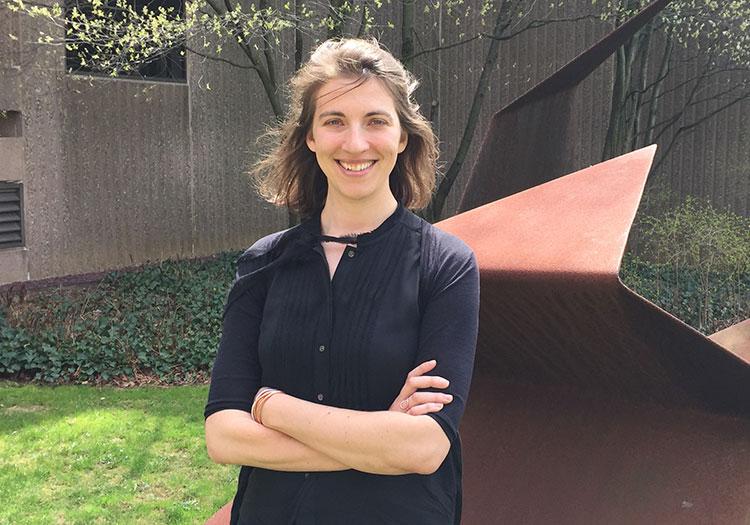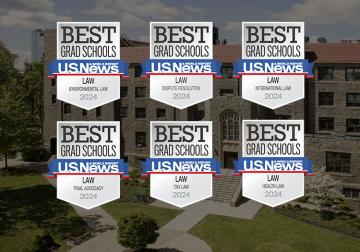Professor Margot J. Pollans Granted Tenure and Promoted to Full Professor of Law

Professor Margot J. Pollans Granted Tenure and Promoted to Full Professor of Law
Pace University’s Board of Trustees approved tenure for Professor Margot J. Pollans. She was also promoted from associate to full professor of law. Professor Pollans joined Pace University’s Elisabeth Haub School of Law (“Haub Law”) faculty in 2015. The Board of Trustees made its decision at its December 11, 2019 meeting.
Professor Pollans teaches environmental law, food law, administrative law, and property law. She is also the faculty director of the Pace-NRDC Food Law Initiative, a collaborative venture between Haub Law and the Natural Resources Defense Council that seeks to promotion transitions to a just and sustainable food system by improving access to legal services for farmers and food businesses.
Her academic work has appeared in a variety of journals including in the New York University Law Review, the Harvard Environmental Law Review, and the Wake Forest Law Review. Most recently, her article, The New Food Safety, (coauthored with Emily Broad Leib), was published in the California Law Review. She is also the coauthor of a casebook on Food Law, the first of its kind.
“Since joining our faculty at the Elisabeth Haub School of Law in 2015, Professor Margot Pollans has enriched our environmental law program immensely,” said Dean Horace Anderson. “She is at the forefront of research in food law and consistently published in top tier journals. Professor Pollans is a real asset to our law school, and she provides Haub Law students with a cutting edge academic and practical learning experience.”
“Professor Pollans' path-breaking work teaching and reforming food law places the Elisabeth Haub School of Law at Pace University at the cutting edge of this growing field,” said Interim Associate Dean & Executive Director, Environmental Law Programs and Haub Distinguished Professor of Environmental Law, Katrina Fischer Kuh. “We are proud and lucky to count Professor Pollans as a colleague."
“I am thrilled and honored by the Haub Law faculty’s decision to grant me tenure,” said Professor Pollans. “It has been a pleasure to work with this incredible community over the last five years, and I am looking forward to many more years of collaboration to come. Haub Law is a very special place; its students, faculty, and staff create a unique community that I consider myself very lucky to be a part of.”
Before joining the Pace faculty, Professor Pollans was the inaugural academic fellow at UCLA School of Law’s Resnick Program for Food Law and Policy. She was also a staff attorney and clinical teaching fellow at Georgetown University Law Center’s Institute for Public Representation, where she worked on a range of environmental litigation and supervised student clinicians. Following law school, Pollans clerked for the Honorable David Tatel of the U.S. Court of Appeals for the D.C. Circuit.
Pollans’s primary research interests lie in the areas of food and agriculture law, public interest environmental law, and land use and property law.
The Elisabeth Haub School of Law at Pace University is home to the #1 ranked environmental law program in the country according to US News and World Report. The Elisabeth Haub School of Law at Pace University launched its environmental law program in 1978, which has long been ranked among the world’s leading university programs. Pace’s doctoral graduates teach environmental law at universities around the world. Pace’s J.D. alumni are prominent in environmental law firms, agencies and non-profit organizations across the U.S. and abroad. Pace’s multiple environmental law programs with Brazil are the most extensive of any U.S. university.
###
About the Elisabeth Haub School of Law at Pace University: Pace University’s Elisabeth Haub School of Law (Pace Law) offers J.D. and Masters of Law degrees in both Environmental and International Law, as well as a Doctor of Juridical Science (SJD) in Environmental Law. The school, housed on the University’s campus in White Plains, NY, opened its doors in 1976 and has over 8,500 alumni around the world. The school maintains a unique philosophy and approach to legal education that strikes an important balance between practice and theory.
The Elisabeth Haub School of Law at Pace University launched its Environmental Law Program in 1978; it has long been ranked among the world’s leading university programs. Pace’s doctoral graduates teach environmental law at universities around the world. Pace’s J.D. alumni are prominent in environmental law firms, agencies and non-profit organizations across the U.S. and abroad. In 2016, the Law School received a transformational gift from the family of Elisabeth Haub, in recognition of its outstanding environmental law programs. For more information visit http://law.pace.edu.
About Pace University: Pace University has a proud history of preparing its diverse student body for a lifetime of professional success as a result of its unique program that combines rigorous academics and real-world experiences. Pace is ranked the #1 private, four-year college in the nation for upward economic mobility by Harvard University’s Opportunity Insights, evidence of the transformative education the University provides.
From its beginnings as an accounting school in 1906, Pace has grown to three campuses, enrolling 13,000 students in bachelor’s, master’s, and doctoral programs in more than 150 majors and programs, across a range of disciplines: arts, sciences, business, health care, technology, law, education, and more. The university also has one of the most competitive performing arts programs in the country. Pace has a signature, newly renovated campus in New York City, located in the heart of vibrant Lower Manhattan, next to Wall Street and City Hall, and two campuses in Westchester County, New York: a 200-acre picturesque Pleasantville Campus and a Law School in White Plains.



